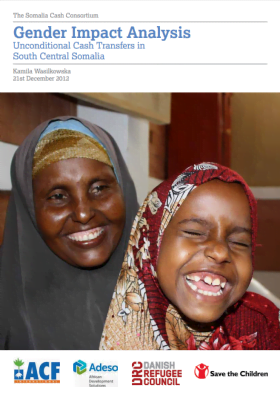Gender Impact Analysis: Unconditional Cash Transfers in South Central Somalia
The Cash Consortium is a group of four NGOs (ACF, Adeso, DRC and Save the Children) that came together in mid-2011 to coordinate their aid response and use unconditional cash grants to meet the basic food and non-food needs of the most vulnerable households in South Central Somalia.
The primary objective of this study is to better understand what impact unconditional cash transfers have on men and women, as well as different population groups (such as IDPs, widowed and divorced women) in an emergency context. In 2012, the Cash Consortium (ACF, Adeso, DRC and Save the Children) commissioned this piece of independent research with the aim of gaining contextual knowledge on cash and gender in South Central Somalia, particularly in the regions of Mogadishu, Hiran and Gedo.
At the centre of this study is a belief that individuals who receive cash in disaster-affected areas (whether men or women) have varying degrees of control over resources and decision-making. Gender is therefore but one factor that affects these levels of control. To answer questions of impact, the study deals with two main areas. First, the study assesses the impact of cash on gender relations within the household, considering areas such as gendered spending. Second, the study looks at the impact of unconditional cash transfers on the wider community, and considers areas such as traditional coping mechanisms, social status and levels of conflict and violence.



